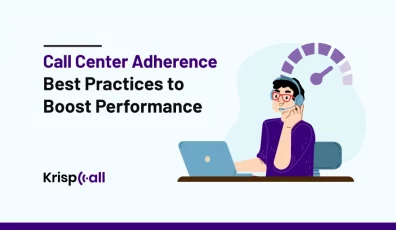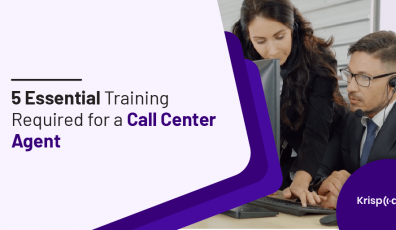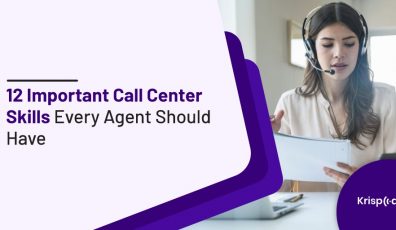After Call Work: What is It & How to Reduce in Call Center?
-
Last Updated: 03 Jan 24
-
10 min read
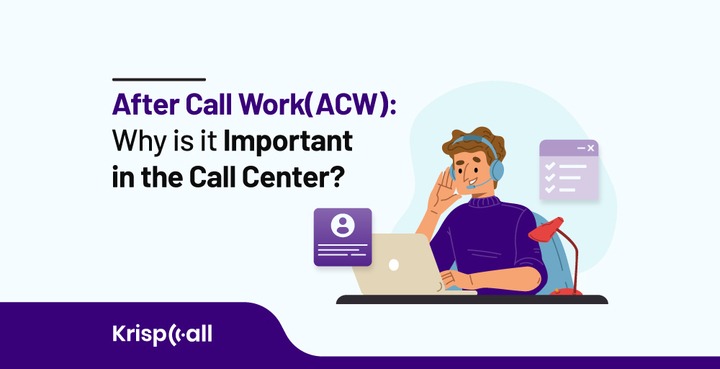
Are you frustrated 😤 by the calls that follow up in your call center, where customers often feel ignored or unsatisfied while agents attempt to wrap up the call?
Ever felt that while working on after-call activities, important possibilities were lost? It’s a frequent problem in call centers where hurrying to wrap up a call frequently results in missed chances for improvement.
This exciting article contains a complete guide to After Call Work (ACW), what it means, its importance, and how to reduce it in call centers.
Keep reading to find out more!
What is ACW in a call center?
After-Call-Work, or ACW, also known as wrap-up time or post-call work, refers to the task that call center agents must follow after conversing with a customer.
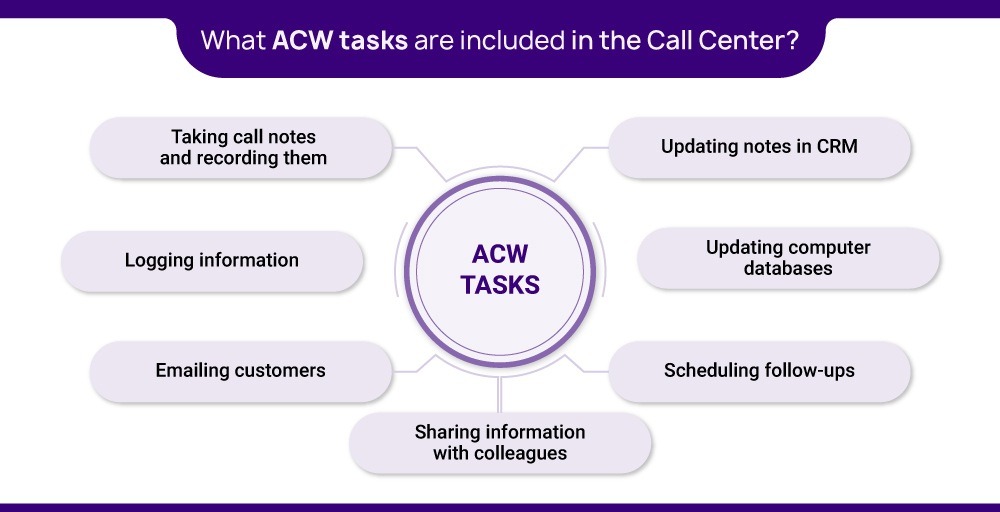
ACW activities could differ depending on the goal of the call, but they typically involve the following:
- Updating client data and logging call causes and results in the CRM
- Writing a call summary and uploading call notes into the CRM system of the call center
- Elevating issues regarding products or services that consumers submit to the appropriate teams.
- Planning and scheduling the necessary follow-up actions after the interaction
- Recording client comments and sending it to the relevant team members
It’s crucial to note that after-call work is an important part of the Average Handling Time (AHT), which in turn affects the overall operational efficiency and agent performance of the call center.
That’s why monitoring the agents’ post-interaction always helps managers gain important insights and this leads to increased productivity & efficiency in the workforce.
What ACW tasks are included in the Call Center?
After-call work contains a series of tasks that call center agents must complete after each call.
These tasks are crucial for maintaining accurate records, improving service quality, and getting ready for future interactions.
ACW duties can change based on the type of call center, the sector, and organizational procedures, however typical duties usually consist of:
- Taking call notes and recording them: Taking notes is a crucial step in the ACW procedure. Call center agents need to document important information during customer interactions.
- Logging information: Call center agents need to record specific details related to customer orders or issues. This log information helps create a detailed record for future reference and analysis.
- Emailing customers: Communicating with clients via email is an ongoing practice in call centers. Call center representatives need to send follow-up information, and respond to inquiries or relevant updates via email.
- Updating notes in CRM: CRM tools are the most important tools for storing and managing customer information in contact centers. Call center agents need to update customer profiles, track customer history, and perform reporting or analysis within the CRM. CRM tools integrate with communication channels like phones, emails, and live chats, which contribute to improvements in service quality and customer relationships.
- Updating computer databases: Call centers often use databases to store and manage customer details, product information, or customer problems. Call center agents are responsible for updating these databases after call work to ensure the information is accurate and up-to-date.
- Scheduling follow-ups: Call center agents are responsible for scheduling follow-up calls or actions if any problems or issues arise with the clients. Customer issues must be addressed promptly, and necessary steps must be taken to resolve any issues.
- Sharing information with colleagues: Call center representatives need to share relevant information or updates about the customer with their colleagues. This teamwork would contribute to resolving issues with the customers and making the workflow efficient.
Why After Call Work (ACW) is an Important Metric in Call Centers?
After Call Work (ACW) plays a crucial role in maintaining effective contact center operations, improving agent performance, and providing top-notch customer service. ACW is an important Key Performance Indicator (KPI) as it directly impacts call center efficiency.
Below are some reasons why ACW is important for a contact center metric:
1. Improved Customer Service
When contact center agents update client information and important details of each interaction in the CRM during ACW, it becomes available and immediately accessible to other agents. Thus, other agents can seamlessly pick up the significant details where the previous agent left off, providing a consistent and tailored customer experience.
2. Reduced Agent Burned Out
The call center environment is the most fast-paced work environment, where agents need to jump from one call to another and often engage in difficult conversations that lead to increased stress and burnout.
Thus, ACW provides the necessary time to contact center agents to update customer records and document essential information about recently contacted customers, update notes in CRM, and be prepared for the next interaction, which allows agents to decompress and lowers the risk of burnout.
3. Efficiency and Productivity
Agents in call centers record customer concerns and issues during calls. Following customer interactions, these issues are transferred to an after-call work task, which needs to be finished within an ACW time frame in order to resolve the client’s issue.
This simplified method aids agents in minimizing obstacles and distractions during ACW, which boosts call center productivity and efficiency overall.
Best Tips to Reduce After-Call Work in the Call Center
Reducing after-call work in the call center helps agents from being burned out, often leading to improving their efficiency and productivity while interacting with customers.
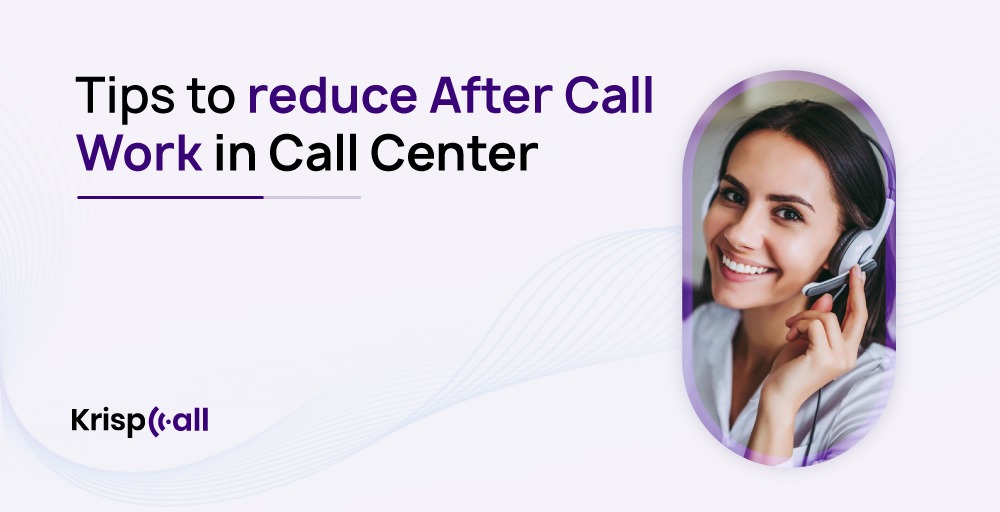
ACW tasks are fast-paced and time-consuming, and call center agents should continuously measure ACW to ensure that they are meeting performance targets
With that in mind, here are some tips to help you minimize ACW and streamline your call center operations:
1. Use Smart IVR Solutions
Interactive Voice Response (IVR) systems are automated telephone systems that communicate with callers using voice or touch-tone keypad selections. Smart IVR systems use advanced technology, such as Natural Language Processing (NLP), to better understand and respond to client queries.
As a result, setting up IVR for your contact center lowers ACW time, frees up agents from tedious work, reduces client frustration, and enables your contact center to handle calls quickly.
2. Automate repetitive tasks
Automation technologies can be used in a call center for repetitive tasks like data entry and customer record updating. These tools include chatbots and virtual assistants, interactive voice response (IVR), automatic call distribution (ACD), CRM integration, and many more.
As a result, agents can concentrate on complex and valuable duties by automating these tasks, which reduces the amount of ACW time required.
3. Targeted training and coaching
Ensure that your representatives are well-trained in controlling your systems, quickly accessing essential information, and efficiently resolving frequent client issues.
Comprehensive training will enable them to manage calls more effectively, potentially minimizing the need for lengthy ACW.
4. Integrating call center software with CRM
Agents can benefit from automated features and faster workflows by integrating call center software with a Customer Relationship Management (CRM) system, allowing them to spend less time conducting After Call Work.
5. Identifying process and system issues
It is critical to evaluate call center procedures and systems regularly to discover obstacles or errors. This involves examining the entire customer engagement process, investigating software functionality, and finding any weaknesses that may contribute to prolonged ACW.
Addressing these challenges can result in more efficient workflows and overall efficiency.
Reduce ACW in Your Call Center Using KrispCall Today
KrispCall offers advanced features like intelligent Call Routing, Call Notes, Call Transfer, smart IVR, Data Backups, and many more. This feature allows contact center agents to record precise information in real-time, which reduces the need for extensive post-call paperwork.
Additionally, call center software like KrispCall can quickly and effectively integrate with your preferred tools like CRM, Help Desk, e-commerce, etc., improving communication capabilities and customer service effectiveness.
If you need technology that can help you to reduce ACW time, improve call quality, and streamline your call center operations, give KrispCall a try.
Book a Free Demo to Learn How KrispCall Reduces ACW in Call Center
Conclusion
After Call Work (ACW) emerged as an important asset in call centers, providing robust customer interactions. ACW improves service quality, reduces errors, and increases customer happiness by giving agents time to keep track of data and conduct follow-up actions.
As technology changes, businesses that adopt the effective use of ACW are better positioned to grow and flourish in providing excellent client experiences. In the ever-changing digital world, stay ahead in customer service excellence by utilizing the advantages of After Call Work.
With KrispCall’s advanced features like Unified Callbox, Intelligent Call Routing, Call Transfer and Monitoring, Voicemail Drop, CRM Integration, and many more, you can easily improve your after-call work in the call center. In addition to these features, what makes Krispcall compelling is its budget-friendly price.
So what are you waiting for? Try Krispcall and improve your After Call Work in the call center!!!
FAQs
How long should ACW Take in the Call Center?
The average ACW time in the call center depends on the sector of your call center, call type, internal process, and agent behavior.
However, the average AWC time in the call center is around 45 seconds. Low-performing call centers have ACW time of 60 seconds or more, whereas high-performing call centers have ACW time of 30 seconds or less.
How ACW is Calculated in a Call Center?
ACW can be expressed as a percentage of total handling time (AHT), which indicates the overall time an agent spends on a call, including both talk time and ACW. The ACW calculation formula is simple:
ACW percentage = (Total ACW time / Total handle time) * 100%
For example, if an agent spends 60 seconds on ACW and 120 seconds on a call, his or her ACW percentage is 50%.
The optimal ACW percentage varies across call centers, but a general guideline targets 25-35%.
What are the after-call work industry standards?
There is no fixed industry standard for after-call work, it depends upon factors such as the purpose of the call, agent performance, and types of tasks involved in the post-call process.
However, the average ACW time in the call center is reported to be around 45 seconds, but it may vary based on the industry and nature of the calls handled.
Can Employer Call You After Work Hours?
Your odds of receiving calls after work hours depend on various factors such as your employment contract, company policy, and labor laws.

